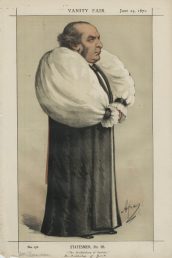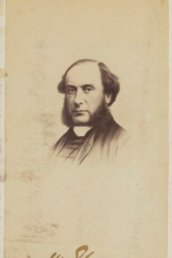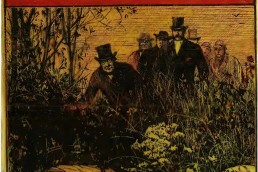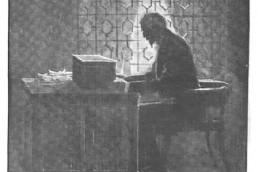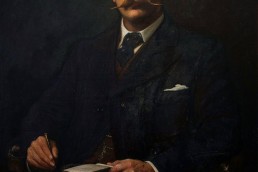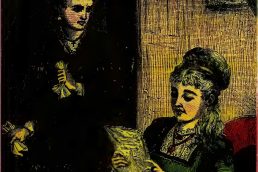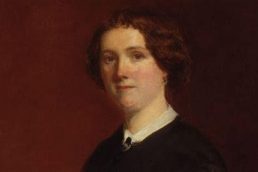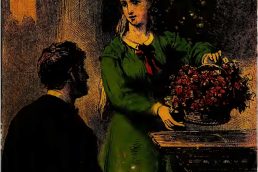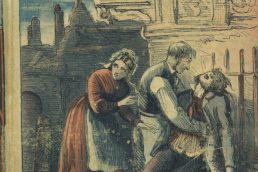The Dublin Evening Mail, of Saturday the fifth of November 1864, relates a story, first printed in The Times, which concerns opinions ventured by the then Archbishop of York, whose views on sensation fiction were scathing:
“…He directly condemned the ‘stimulating narratives’ of the present day called ‘sensation novels’ and pronounced that style of reading to be thoroughly false and dangerous” (1864. p.1). His belief was that “useful reading” — though not necessarily confined to literary writing connected to a person’s trade, should “enlarge the sympathies and improve the understanding” (Anon, 1864, p.1). The Catholic Telegraph from the 19th November 1864 also reports on His Grace’s words and quotes him as saying that sensational novels:
Exhaust and enfeeble the imagination before it has come to its full growth. Working constantly upon people’s emotions without giving them the opportunity to put in practice what the emotion suggested, is a great evil. It wears out the man – in the finer part of him and he becomes jaded and pale […and] unable to do the thing he is intended by his maker to do. (1864, p.4)
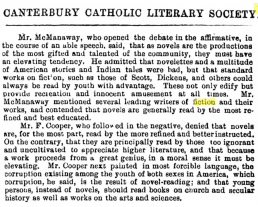

To their credit, the Dublin Evening Mail refused to be intimidated and, though they expressed their “adhesion in the main to the Archbishop’s opinions”, they go on to “state what may be said on the other side” (1864, p.1). On the other hand, The Catholic Telegraph (1864, p.4) are more committed to the ‘party line’, expressing joy at the support of a “Protestant Prelate” to their view that sensation fiction “creates in those who indulge in it to excess, a listlessness and repugnance for any other species of reading, whether it be religious or moral, useful or instructive.” They go on to castigate the “humblest classes” whose masculine pursuit is drink and the feminine equivalent is to intoxicate themselves with “stimulants of the cheap press” in their own homes (p.4). One can only speculate what their views might be, should they be somehow transported through time to the current day, what kind of Hades they would see that Man has created for himself with such thrills as Harry Potter or Game of Thrones. Indeed, one might assume that such Victorian religious ‘thunderers’ as the editor of The Catholic Telegraph, or indeed the prelate himself, would despair completely.
In a different publication, thirty years later, ‘An Intolerant Churchman’ (1896, p.5) in The Lyttleton Times is clearly fed up with the rhetoric of the hard-liners as he reacts to the complaints of the Dean of Rochester: “the criticism of readers of fiction as: ‘”silly and indolent folk’” is one, which on the face of it is neither very charitable, nor absolutely correct.” (p.5). The obvious deduction to make from the strong words from Church publications of various denominations is that Christian religious belief was dipping among the masses of people on whom the Church had hitherto been able to rely. The publication of Darwin’s evolutionary ideas and the advance of Science undermined traditional beliefs. Julie Bizzotto (2013, p.297), quotes the historian Owen Chadwick: “mid-Victorian England asked itself the question, for the first time in popular understanding, is Christian faith true?” As Mary Elizabeth Braddon and Wilkie Collins paved the way for the fiction that excited the masses, a more secular society began to emerge causing the outrage of those staunch churchmen and publications who feared moral and religious decline. Reflecting on these views from a twenty-first century viewpoint, it might be tempting to look on these events with patronising smugness, feeling perhaps lucky that we live in a more tolerant society. Yet are not similar issues still prevalent in society, regarding perceived falls in moral standards, resistance to change and intolerance to those who appear different? Even now, Women are still not completely equal to men, nor has racial and sexual abuse been eradicated and the older generation of today are still concerned about the intoxication of young people by computer games, loud music and fictional worlds that seem alien and immoral.
Bibliography
Anon. (1896) An Intolerant Churchman. Current Topics. The Lyttleton Times. [Online] 12th December. Available from: <https://paperspast.natlib.govt.nz/newspapers/LT18961212.2.32?end_date=31-12-1901&items_per_page=10&page=3&query=sensation+Fiction+Catholic&snippet=true&start_date=01-01-1839> [Accessed 28 March 2021].
Anon. (1887) Canterbury Catholic Literary Society. New Zealand Tablet. [Online] 14 October, 15(25), p.7. Available from: <https://paperspast.natlib.govt.nz/periodicals/NZT18871014.2.7?end_date=31-12-1901&items_per_page=10&page=21&query=fiction&snippet=true&start_date=01-01-1861> [Accessed 22 March 2021].
Anon. (1864) Cheap Publications – Sensation Literature. The Catholic Telegraph. [Online] 19 November. Available from: <https://www.britishnewspaperarchive.co.uk/viewer/bl/0000821/18641119/046/0004> [Accessed 28 March 2021].
Anon. (1864) Sensational Fiction (From The Times). The Dublin Evening Mail. [Online] 5 November. Available at: <https://www.britishnewspaperarchive.co.uk/viewer/bl/0000433/18641105/001/0001> [Accessed 27 March 2021].
Anon. (after 1862) William Thomson. [Online photograph] <https://www.npg.org.uk/collections/search/person/mp57969/william-thomson> [Accessed 28 March 2021].
Bizzotto, Julie. (2013) Sensational Sermonising: Ellen Wood, ‘Good Words’, and The Conversion of the Popular. Victorian Literature and Culture, 41(2), pp. 297–310., <www.jstor.org/stable/24575701> [Accessed 28 March 2021].
Pellegrini, Carlo. (1871) William Thomson (‘Statesmen, No. 86.’). [Cartoon] In: Vanity Fair 24 June, 1871. [Online] Available from: <https://www.npg.org.uk/collections/search/portrait/mw255761/William-Thomson-Statesmen-No-86?> [Accessed 13 May 2021]

